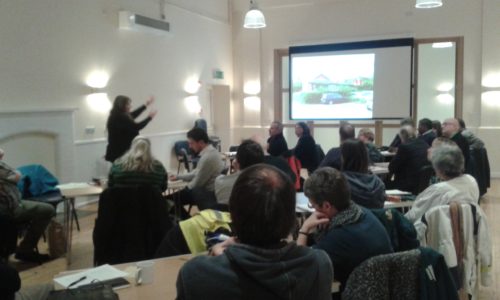2018 Update Report on Exeter Community Strategy
www.exetercommunityforum.net
The Exeter Community Strategy, adopted by the Council has been an important consensus between the Council and Community Organisations designed to underpin community-led development in the city for ten years from 2016.
To “provide a way for the community to take the lead, build its capacity to own and manage assets, work with partners, and fund and deliver initiatives and services. It is based on a statement of principles of community-led development to which partners are invited to sign up, and will embody openness and accountability in all its activities.”
Purpose of the report: To provide an update on Exeter City Council’s progress on delivering the Exeter Community Strategy
Background
In 2014, co-operation between community-led groups engaged in the planning process met with Exeter City Council. In early 2015, Exeter City Council decided the neighbourhood CIL should be spent on developing and implementing a community-level strategy for addressing the demands of development, endorsing a ‘bottom-up’ asset based community development approach, noting that community groups had undertaken to engage with others across the city regarding a process for allocating the neighbourhood CIL.
The Exeter Community Forum was set up to enable community associations to meet formally with other organisations, alongside local councillors, to promote community-led development and oversee the implementation of the Exeter Community Strategy which the Council adopted in March 2016.
In particular, the Council tasked the Forum to play an active role in allocation of the neighbourhood portion of the Community Infrastructure Levy (“the neighbourhood CIL”). The neighbourhood portion of the total CIL receipts over the next 10 years is approximately £3.75 million. Executive approved the ring fencing of these funds for implementing the Exeter Community Strategy at its 10 February 2015 meeting. The Council also agreed that £150,000 of New Homes Bonus funding be used over the next 2-3 years to support capacity building work with community groups across the city that require investment to enable them to access the CIL neighbourhood funding in future years.
Since 2015 the Council and Forum have met together through a Steering Group and meetings of the Forum to progress an agreed annual workplan informed by the Community Strategy.
Commitments by the Council
Exeter City council have committed to a shared vision and a statement of principles of community-led development. The strategy promotes community-led development- a way of strengthening civil society by reflecting the importance of the views and actions of communities, when making policy and delivering actions. It “empowers local communities, by increasing the capacity of people as active citizens, through their community groups, organisations and networks, and Institutions and agencies (public, private and non-governmental) to work in dialogue with citizens to shape and determine change in their communities.” This is further explained in the strategy. The Council has since stated its commitment to ‘asset based community development’.
The strategy’s approach reflects four ambitions:
- Strategy should be community-led throughout its life, and change as the city, and the people and communities within it, change. To ensure this happens, it will be important that there is a mechanism to ensure communication between organisations in communities across the city. The Exeter Community Forum has been established for this purpose, and it is recommended that the Forum continue to operate to enable it to oversee progress on, and propose changes to, the strategy as they are needed.
- To increase the confidence and capacity of community organisations to develop their own activities, and secure funding for them beyond any grant made under one of the programmes in this strategy.
- To complement other investment taking place across the city, either directly, by providing match funding for key initiatives that help to achieve the strategy aims, or indirectly, by supporting a complementary initiative. An example of this is supporting community organising; the organisers who are recruited may well help people access initiatives supported by other investment streams in the city
- To stimulate joint commitment. Part of this comes from encouraging dialogue and joint activity between organisations and agencies working within each community, sometimes in the same building.
Update on progress – to be read in conjunction with the community strategy.
Programme 1: Supporting community plans
A ‘community plan’ identifies local problems and opportunities, sets out an achievable and long-term vision for the future, and prepares a plan of action to achieve it. Provides a framework for delivering activity which the community has developed. It can also assist authorities in service delivery and decision-making, including by forming a material consideration for planning purposes. Community plans can be developed as formal ‘ Neighbourhood Plans’ recognised as part of the planning system.
“The programme will pay for a community planning facilitator who will help communities, particularly those which have the greatest need, to prepare and produce plans and offer capacity building support and training. The facilitator may be hosted by a community organisation, to act as a central resource covering the whole city. The programme’s output will be six community plans in development or completed by March 2019.”
Progress
- The role of community and neighbourhood plans have been informally discussed at a meeting with the Director for Communities, Head of Planning, (then) Chair of planning committee, Portfolio Holder for Communities and Sport, the Director and the ECF Chair in July 2017. Such plans not only help communities themselves to identify and respond to local need but also complement data gathered by councils and council programmes and were included in the Sport England bid.
The framework was agreed in principle, with some amendments required, but requires follow up for wider discussion with councillors and Community Groups. See appendix 1. To enable such plans come into being support and funds are required.
Once the role of such plans and support needs understood for their development by communities, then a programme of support and funding can be agreed and delivered. The implementation of this programme is yet to progress.
- ECF have responded formally to the GESP statement (http://exetercommunityforum.net/wp-content/uploads/2017/02/ECF-response-to-GESP-SCI-April-2017.pdf April 2017) of community involvement making recommendation for improvements and how communities might be involved in the process. An informal response has been given but no formal response has been received. The informal response included an invitation to contribute feedback from community organisations in Exeter and the GESP programme develops. Information about the timetable was promised so that input can be made in a timely fashion.
Programme 2: Supporting community action
Community action is at the heart of community-led development. This programme will promote it through:
- Supporting community organising.
ECF worked with community organisations to engage in the development of the community builders programme. Identifying areas that actively wanted to work with a community builder and those areas with less capacity that might especially benefit from such work. Considerable time and energy went into ensuring the programme integrated with Wellbeing Exeter and the community connectors.
In March 2018 the Executive agreed to expand community building so that all wards would have access to a community connector and community builder, funded by an increased allocation of CIL.
The programme implementation has been significantly delayed however, the programme is now being led by ECI and community organisations are still very keen on the programme and to be involved.
The Chair of the Community Forum was invited to be on Wellbeing Exeter, however she felt it would be more appropriate for a community member from one of the local support groups, to be established in each area, to join to provide some input from a volunteer perspective. This requires action by Wellbeing Exeter.
As the programme becomes established there needs to be discussion and agreement about how community support groups/and community organisations connect with the work of their local community builder.
2Supporting community initiatives.
Grass Roots Grants:
The council and the community forum have worked together to adopt a terms of reference, agreed by the Council, for all sorts of local Community Organisations to apply for grants funded by the CIL. The grants panel is made up of Councillors and Community advocates nominated by ECF members and chaired by the ECF Chair. This brings together a wide range of expertise and insights to the panel and providing capacity building experience for those on the panel. The members of the grant panel received training from a Councillor on best practice in making grants decisions.
It was agreed by the ECF Steering Group that community members from ECF member organisations would undertake peer review to monitor and evaluate the impact of the awarded grants in order to provide extra capacity to the Communities Team and provide important peer learning opportunities. 20 community members have signed up. However, the implementation of this has not been progressed.
Most of the grants have been smaller revenue grants and one round focused on larger sums to invest in community buildings. The grants process and panels have worked very well and all grant recommendations have been approved by the Council Executive and full Council.
The process has been open, fully accountable and transparent and the Council’s internal audit did not identify any problems with the governance of the Grass Roots Grants. The Council earlier this year changed the terms of reference of the grants panel without any discussion with the Exeter Community Forum. The ECF Steering Group have not reviewed these changes, nor been invited to do so.
Programme 3: Supporting community collaboration
“This programme will be delivered through a community collaboration fund. The fund will, so far as resources permit: 1. Focus on community capacity-building, 2. Include funding for work which tests new approaches. 3. support joint activity among community organisations, or between community organisations and local authorities or other agencies, and 4. be accessible to partners who have signed up to the principles of community-led development.”
ECF has contributed to Exeter Board and Health and Wellbeing Board and to city wide initiatives including: The Exeter Youth Strategy, Wellbeing Exeter.
No joint initiatives have been developed or funded under this programme. However, the following should be noted:
- Of particular relevance is the youth strategy’s priority to enable greater youth participation in their local areas and Community Associations are keen to be involved in this area of work. ECF members have begun some discussions about this which can be built on to enable greater youth participation in local matters and also local community organisations.
- There is clear interest in developing joint initiatives and contributing to strategy and policy making, especially in the area of parks and open spaces, but there is currently no clear mechanism within the Council to enable community contributions.
Other
Community Asset Transfer: A commitment was made at a Scrutiny committee meeting in 2016 for Exeter city council to introduce a community asset transfer policy. A very successful workshop was run at the November 2017 conference with the City Surveyor. such a policy will be able to clarify the basis and process for asset transfers setting our the expectations and protections required for each side. Relevant resource have been sent to the Council. We are waiting to hear how and when the policy will be developed.
Training/learning events: The Council/ ECF have run two successful Community conferences/training events, attended by councillors and community volunteers. The most recent (November 2017) in conjunction with the Network of Wellbeing, the Eden project communities team and Exeter City Futures. Topics included fundraising, transferring assets from councils to communities, how to collect and use evidence to build community, Asset Based Community Development (ABCD), legal structures.
Network meetings: The Community forum has met on a regular basis to progress the items in this report and identify capacity building needs and provide valuable networking opportunities between community organisations and Councillors. Community organisations have expressed an interest in contributing to relevant Council polices and strategies – the process for this is not especially clear and clarification and discussion about how this can be achieved would be welcome.
Collaboration among community organisations: There has been an ongoing and increasing interest in how community associations (based on localities), can work with organisations of communities of interest and communities of identity. In particular to ensure that initiatives with different groups can dovetail. We are at early stages here.
Crowdfunding: The Chair spent some time contributing to discussions about the development of a crowdfunding site for Exeter with Spacehive – this developed into Exeter City Futures crowdfunding page. Since then Devon County council and the District Council have set up a separate crowdfunding initiative, so the task in the community strategy has been achieved by others.
see: Crowdfunding https://exeter.gov.uk/people-and-communities/grants/community-grants/crowdfund-exeter/
Appendix 1: draft framework for community/neighbourhood planning.
DRAFT Enabling Communities in Exeter to get involved in Planning.
This document provides a framework for developing the Exeter Community Strategy’Programme 1: Supporting Community Plans.’[1]
“A community plan identifies local problems and opportunities, sets out an achievable and long term vision for the future, and prepares a plan of action to achieve it. It is crucial to community-led development, because it provides a framework for delivering activity which the community has developed. It can also assist authorities in service delivery and decision-making, including by forming a material consideration for planning purposes.”
| Name of Plan | What’s the purpose of the plan? | Any legal status? | ECC support response & use of plan | Community Role | Resources and examples locally |
| Neighbour-hood plan | A document that sets out planning policies for the neighbourhood area, these planning policies are used to decide whether to approve planning applications | Yes. Neighbourhood planning is a right for communities introduced through the Localism Act 2011. The plan becomes part of the Local Plan | https://www.gov.uk/guidance/neighbourhood-planning–2
https://mycommunity.org.uk/take-action/neighbourhood-planning/
St James Neighbourhood Planhttp://www.exeterstjamesforum.org/Plan |
||
| Community Plan | Communities of interest or geography coming together, and with others, to develop a plan. This plan may cover a number of themes/issues for an area or a theme across a large area/the city.
For example: community planning for low carbon communities; increasing resilience to the impact of weather and climate change (flooding); to inform the development of a community and the services it needs or change it want to make; themed plans e.g. open spaces. |
No.
But could be considered as a material consideration in some planning matters |
http://www.communityplanning.net/aboutcp/aboutcp.php
examples: Topsham community plan; St Thomas Flood plan Priory Community plan https://priorycf.wordpress.com/community-plan/ |
||
| Area action plan | Small area (ward sized or less) based plan focused on tackling a specific issue, development of a service, economic regeneration of an area or relating to planning and development. | No.
But could be adopted by the Council as supplementary planning guidance |
Examples:
Supplementary planning guidance : Development brief for Alphingtonhttps://exeter.gov.uk/media/1656/alphington-sw-development-brief.pdf |
||
| Street action plan | To agree action in a specific street.
It will bring neighbours and others together to focus on change. It may focus on one or more issues. For example, improving green space, management of rubbish bins, arranging a community event or improving parking arrangements. |
No |
Alongside Neighbourhood Planning a number of other community rights were introduced in the Localism Act 2011, which could be used alongside anyof the pans listed above:
Community Right to Build: is a type of type of Neighbourhood Development Order that can be used to grant outline or full planning permission for specific development which complies with the order. For example: homes, shops, businesses, affordable housing for rent or sale, community facilities or playgrounds. A Community Right to Build Order is put together by local people who can decide on the type, quantity and design of buildings they want, and in the locations they want them. https://mycommunity.org.uk/resources/understanding-the-community-right-to-build/
Community Right to Bid: Community Right to Bid allows communities (and parish councils) to nominate buildings or land for listing by the local authority as an asset of community value. If the assets comes up for sale, the community can ‘pause’ the sale and take up to six months to find the funding required to buy the asset. https://mycommunity.org.uk/resources/understanding-the-community-right-to-bid/
Community Right to Challenge: The Community Right to Challenge is the right for community organisations to submit an expression of interest in running services of local authority and fire and rescue authorities on behalf of that authority. https://mycommunity.org.uk/resources/understanding-the-community-right-to-challenge/
Community Right to Reclaim Land: allows communities to challenge local councils and some other public bodies to release their unused and underused land. As land is held on the behalf of the taxpayer, councils have a duty to use it effectively. The Rights gives communities the power to ensure that they do so. https://mycommunity.org.uk/resources/understanding-the-community-right-to-reclaim-land/
[1]http://exetercommunityforum.net/wp-content/uploads/2016/06/Exeter-Community-Strategy-adopted-22-03-16.pdf

 “This summer we are planning, as part of the Wellbeing Exeter project, to carry out listenings with residents across Exeter to find out what people love about their community and what they do to look after their wellbeing.
“This summer we are planning, as part of the Wellbeing Exeter project, to carry out listenings with residents across Exeter to find out what people love about their community and what they do to look after their wellbeing. the Labour and Cooperative Councillor for St Thomas and Portfolio Holder and Lead Councillor for Communities and Culture.
the Labour and Cooperative Councillor for St Thomas and Portfolio Holder and Lead Councillor for Communities and Culture.